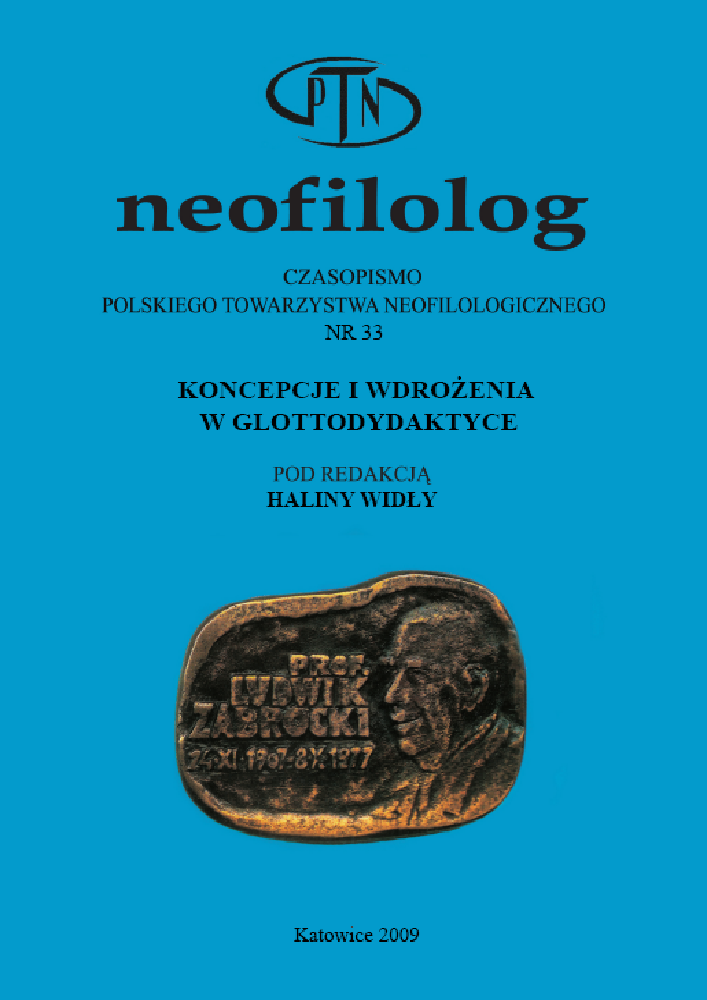Abstract
The main goal of this article is to describe the legal status and situation of disabled learners in Poland, the UK and in other European countries. The author wishes to analyze whether the trends advocated by the principles of Political Correctness (PC) have influenced the language used in the educational context, and, in particular, towards students of special education needs (SEN). The article attempts to demonstrate that neither English nor Polish are sufficiently polite in terms of describing, categorizing, evaluating or naming all the learners, who, owing to their mental or physical impairment, have Special Educational Needs.
References
Allan, K. and K. Burridge. 1991. Language Used As Shield and Weapon. New York: Oxford University Press.
Bańko, M. 2005. Słownik Peryfraz czyli wyrażeń omownych. Warszawa: Wydawnictwo Naukowe PWN.
Dąbrowska, A. 1993. Eufemizmy współczesnego języka polskiego. Wrocław: Wydawnictwo Uniwersytetu Wrocławskiego
Dąbrowska, A. 2005. Słownik Eufemizmów Polskich czyli w rzeczy mocno, w sposobie łagodnie. Warszawa: Wydawnictwo Naukowe PWN.
Grodziński, E. 1980. Wypowiedzi performatywne. Z aktualnych zagadnień filozofii języka. Warszawa: Wydawnictwo PWN.
Kita, M. 2005. Językowe rytuały grzecznościowe. Katowice: Wyższa Szkoła Zarządzania Marketingowego i Języków Obcych w Katowicach.
Marcjanik, M. 2001. ”Etykieta językowa” w Współczesny język polski. Lublin: UMCS.
Marcjanik, M. 2007. Grzeczność w komunikacji językowej. Warszawa: Wydawnictwo Naukowe PWN.
McMinn, J. 2006. Supporting Children with Speech and Language Impairment and Associated Difficulties. Continuum: London.
Krasowicz-Kupis,G. i K. Wiejak. 2008. Skala Inteligencji Wechslera dla Dzieci (WISC-R) w Praktyce Psychologicznej. Warszawa: Wydawnictwo Naukowe PWN.
Mazińska, M. 2004. Polityka Edukacyjna Unii Europejskiej. Warszawa: Wydawnictwa Szkolne i Pedagogiczne Spółka Akcyjna.
Rees, N. 1994. The Politically Correct Phrasebook. What they say you can and cannot say in the 1990s. London: Bloomsbury.
Rees, N. 2006. A Man about a Dog. Euphemisms & Other Examples of Verbal Squeamishness. London: Harper Collins Publishers.
Rzeżnicka-Krupa J., „Językowy obraz niepełnosprawności (komunikat z badań)”. W: Integracja osób niepełnosprawnych, (red.) Kazanowski Z., Osik-Chudowolska D., Wyd. UMCS, Lublin 2003, 87 – 88.
Strong, J. and M. Flanagan. 2005. AD/HD For Dummies. Indianapolis: Wiley Publishing, Inc.
Waterhouse, S. 2000. A Positive Approach to Autism. London: Jessica Kingsley Publishers Ltd.
Woodford, K. and G. Jackson (eds. et. al.) 2003. Cambridge Advanced Learner’s Dictionary. Version 1.0 on CD-Rom based on the printed edition of Cambridge Advanced Learner’s Dictionary. Copenhagen: Cambridge University press.
INNE:
Smyth, B. “How do we meet the challenge of diversity?” in SCAN vol. 24 no.3 August 2005; http://www.schools.nsw.edu.au/media/downloads/schoolsweb/studentsupport/programs/disability/challenge.pdf DW 15.11.2007.
Ustawa z dnia 7 września 1991 r. o systemie oświaty (tekst jednolity Dz. U. z 1996 r., Nr 67, poz. 329 z późniejszymi zmianami
The Disability and Discrimination Act (1995)
Children Act (1989),
The Education Act (1996)
Special Education Needs Code of Practice (2001)
License
Copyright (c) 1970 Iwona Dronia

This work is licensed under a Creative Commons Attribution-NoDerivatives 4.0 International License.
Authors
Authors of texts accepted for publication in Neofilolog are required to complete, sign and return to the Editorial team’s office the Agreement for granting a royalty-free license to works with a commitment to grant a CC sub-license.
Under the agreement, the authors of the texts published in Neofilolog grant Adam Mickiewicz University in Poznań a non-exclusive, royalty-free license and authorize the use of Attribution-NoDerivatives 4.0 International (CC BY-ND 4.0) Creative Commons sub-license.
The authors retain the right to the free disposal of the work.
Users
Interested Internet users are entitled to use works that have been published in Neofilolog since 2017, under the following conditions:
▪ attribution – obligation to provide, together with the distributed work, information about the authorship, title, source (link to the original work, DOI) and the license itself.
▪ no derivatives – the work must be preserved in its original form. Without the author's consent, it is not possible to distribute the modified work in the form of translations, publications, etc.
Copyrights are reserved for all texts published since 2017.
Miscellaneous
Adam Mickiewicz University in Poznań retains the property right as a whole (layout, graphic form, title, cover design, logo etc.).
